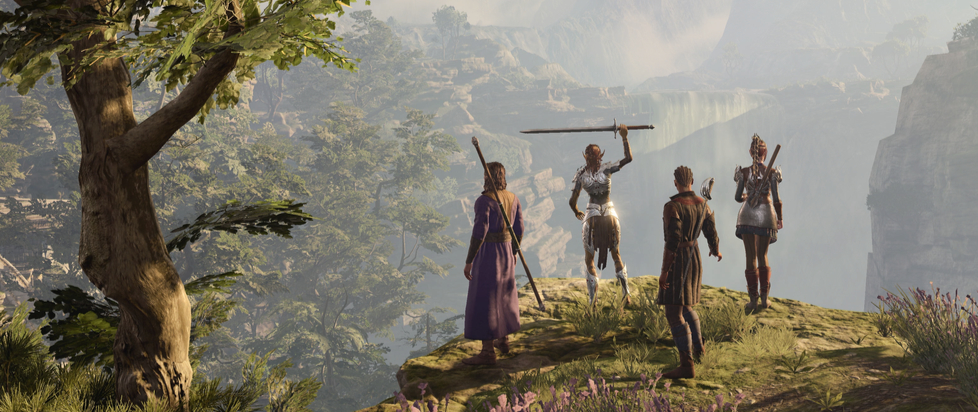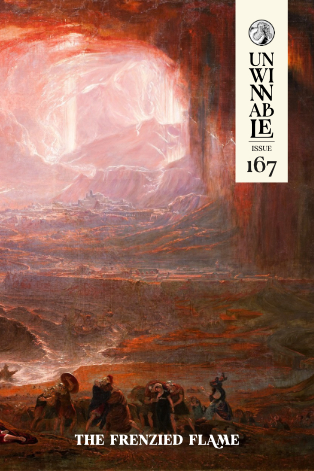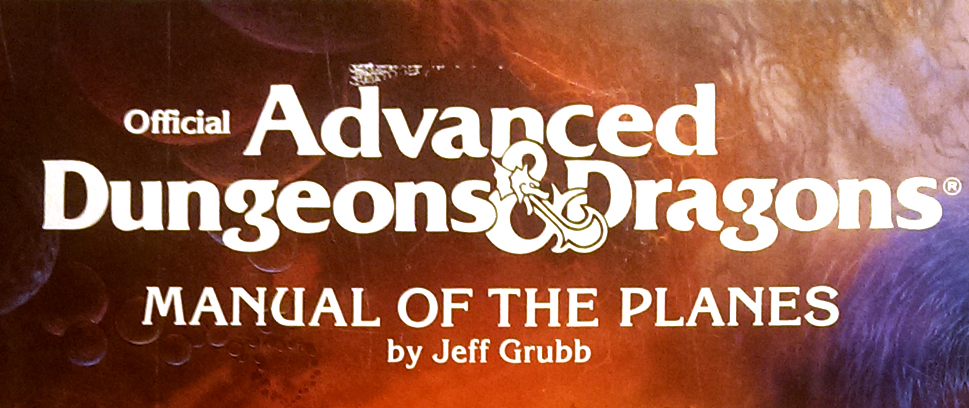
Space in Translation

This column is a reprint from Unwinnable Monthly #167. If you like what you see, grab the magazine for less than ten dollars, or subscribe and get all future magazines for half price.
———
What does digital grass feel like?
———
If I were playing Baldur’s Gate 3 as a D&D game, I’m absolutely convinced that I’d be the most annoying player at the table.
“I’m going to push them off the edge.” “Okay, roll an athletics check.”
“I’m going to push them off the edge.” “Roll athletics.”
“I’m going to push—“ “Jay. You can’t just solve every problem by pushing your enemies off ledges.”
Except that you can! It’s not my fault that this is my one single combat move. The game makes it so easy – and so tempting.
It’s also a lot more fun in a videogame than I imagine it would be at the table. Without the visual representation of a guy just absolutely ready to topple over backwards into a shadowy chasm it wouldn’t be as alluring, and even if you have miniatures and a detailed, vertical map on the table, your DM would presumably get wise and stop putting their NPCs there.
But Baldur’s Gate 3 is a product of translation; from a game that takes place mostly in the imagination to one that has both the advantages and the limitations of an open world videogame. Characters can climb up cliffs with enticing animations, just absolutely telegraphing your chance to shove them right back down. But they also will continue to do that, because the game – as flexible as it is – still can’t adapt in the way that a GM can.
But what Baldur’s Gate 3 loses in creativity by being a simulation, it gains in slapstick. The game revels in the opportunities it gains by using D&D’s mechanics in a space represented visually and dynamically. Push every enemy off ledges, they say. It’ll be funny.
And it is! Plus, it’s not just the combat either. If you’ll permit me to tell a story that spoils a minor Act 1 encounter, there’s a village early on that’s been overrun by goblins. I had persuaded them all to leave, which I do find somewhat underwhelming in parts, and so was drifting onwards in search of something to more interesting to do.

Up above the village, there’s a big canvas windmill, and a splinter group of the goblins are bullying a gnome that they’ve tied to the spokes. My character, also a gnome, stepped in indignantly.
The fight went a couple of ways (I’m not getting into save scumming discourse but how are you even playing without it) but again, wasn’t broadly anything to write home about. But goblins out of the picture, Tav stepped around to the back of the windmill, victorious, ready to be the hero and rescue this poor guy.
And then she pulled the wrong lever. The windmill suddenly sped up to inconceivable levels, flinging the gnome off like a champion shot put, their body cartwheeling through the air while I watched on in shock, confusion, and – sorry – delighted glee.
There’s no pop-up telling me what happened. For a desperately optimistic moment I think that I might be able to go and find them wherever they landed. I open my journal and see what it has to say. “Quest completed!” it tells me, excitement rolling off the exclamation mark. Then: “The deep gnome was killed.”
Because I’m fully aware telling a story from an RPG of any kind is bordering on a “you had to be there” moment at best, I cannot stress enough how funny this was to experience. And it’s not that it wouldn’t be funny if this happened around a table with good friends – in fact, it would be excellent, and the whole point of TTRPGs, in my opinion, is to make silly little situations and cry laughing about them. I’m sure some of this comes across in BG3’s multiplayer, too, although I haven’t been adventuring that way myself.
But the game, at its core, is a translation, and translations can’t be literal. Instead, translating the collaborative, improvisational humor of a tabletop game into slapstick in an open world one was an interpretive masterstroke on the part of Larian Studios.
The translation doesn’t work in other ways. I constantly wish for a GM so that I can just say “I go to the trader” to rather than spending five minutes waiting for my characters to physically walk over there. But it’s worth it to be able to solve all of my problems with a bit of positioning and a good shove.
———
Jay Castello is a freelance writer covering games and internet culture. If they’re not down a research rabbit hole you’ll probably find them taking bad photographs in the woods.




